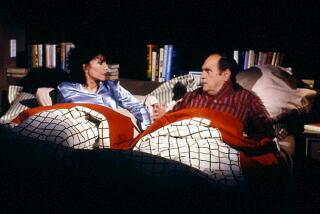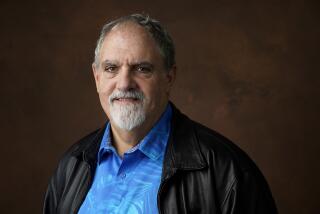From the Archives: TV Actor Michael Landon Is Dead at 54
Michael Landon, the buoyantly handsome actor whose drive for success led him into an often-daring production career, died Monday of the cancer that was diagnosed three months ago.
Landon, who literally grew up before America’s eyes during the 14 years that he portrayed Little Joe on the expansive television Western “Bonanza,” was 54.
He died at midafternoon in his Malibu home with his wife, Cindy, and other family members at his bedside, said Ronne Schmidt, a receptionist for Landon’s attorney and friend, Jay Eller. Funeral services will be private. The family requests that donations be sent to the American Cancer Society.
The actor’s condition had deteriorated rapidly since April 8, when he announced that he had inoperable cancer of the liver and pancreas.
“I am going to fight it,” the father of nine natural and adopted children from three marriages said at a news conference at his ranch home. “Every moment gets a little more important after something like this. Live every moment, guys.”
A few minutes into the solemn media gathering, he shifted gears, announcing that “I want my agent to know that this shoots to hell any chance of doing a health food commercial.”
In the intervening weeks, tens of thousands of get-well cards from around the world were delivered to his home, or to his production office, where he had conceived TV series ranging from peripatetic angels to Western pioneers to specials about bed-wetters and high school athletes, both of which Landon was.
In May, Landon appeared with his friend and neighbor, Johnny Carson, on “The Tonight Show” and criticized the tabloids for speculating on how long he was expected to live. The tabloids nevertheless continued the onslaught.
Carson, whose son Richard was killed June 21 in a car accident, said Monday:
“This has been a devastating week for me and my family. Michael called last Monday expressing his deepest sympathy on the death of my son Ricky. The courage and sensitivity he showed in our conversation, in comforting me while he was in great pain, attests to the quality of this man and his character.”
Landon was born Eugene Maurice Orowitz in Forest Hills, N.Y., to publicist and theater manager Eli Orowitz and former Broadway musical comedy actress Peggy O’Neill. His childhood was miserable at best. He had to fend off beatings from a suicidal mother who wished him dead, while coping with the conservative WASPs in Collingswood, N.J., where he was one of two Jewish boys growing up in that town.
He told Redbook magazine in 1987 that he had not been popular in elementary school because he was a straight A student. He tried to change that in high school, and graduated second from last in a class of 301.
Although slight of build, through determination and hundreds of hours of practice he set a national high school record in javelin hurling with a toss of 211 feet, 7 inches.
It was on the athletic field that he first tasted the sweetness of public adulation that was to remain with him. “I delighted in seeing the shock on people’s faces when they saw such a scrawny guy get such distance,” he told TV Guide in 1969.
His skills brought him an athletic scholarship from USC, and a belief that, like Samson, his strength was somehow linked to his long hair.
True or not, the tenet became real when some disapproving fellow athletes at USC forcefully gave him a crew cut. Landon found that he had lost 50 feet off his best marks and then injured ligaments in his arm by trying to make up that distance.
His athletic career at an end, he left USC at the end of his freshman year, sold blankets, worked as a stock boy and was unloading freight cars at a warehouse when a would-be actor asked him to help him prepare for an audition.
Eugene Orowitz was so intrigued with the idea of acting that he signed up for instruction at Warner Bros. When the audition was held, it was Landon—not his freight-car colleague—who was asked to join the studio’s acting school.
Landon wanted to scrap his given name for Mike Lane, but the Screen Actors Guild told him the name was taken. After scanning a telephone book, he picked Michael Landon. Four months later, Landon was cast in a starring role in television’s “Telephone Time.”
Landon made his movie debut in 1957 in “I Was a Teen-Age Werewolf,” now a cult classic.
After a number of smaller television roles—including a part in the Western series “Restless Gun” (1957-59)—he was cast as the romantic, spontaneous and mildly irreverent Little Joe Cartwright in “Bonanza.”
The NBC Western, centered on a widower who was the father of three widely disparate sons from as many marriages, ran from 1959-73.
For most of the 1960s, “Bonanza,” which ran on Sunday nights, was the most popular show on television, and was No. 1 from 1964 to 1967. At the time, it was seen weekly in 87 countries by an estimated 400 million viewers.
It was while he was acting in that series that Landon began writing. One week in 1963, he recalled, there was no “Bonanza” script, and if one did not surface by that Monday morning the show would stop production. On Friday, Landon said, he sat down on his living room floor with a pencil and yellow pad of paper and, using a coffee table as a desk, turned out a script about the Cartwrights being mistaken for bank robbers.
Next was directing.
“After the show had been on four or five years he came to me and said he’d written a show he wanted to direct,” said the late Lorne Greene, who portrayed Ben Cartwright, the owner of the prosperous thousand-square-mile Ponderosa ranch in Comstock Lode country in Nevada. “I told the producer I thought it was a wonderful idea. Michael has a wonderful imagination and knows how to touch people.”
Landon wrote and directed other segments of the highly respected Western where interaction among characters was given precedence over plot and violence.
With Landon’s passing, the only original “Bonanza” cast member alive is Pernell Roberts.
“Mr. Roberts is deeply grieved by Michael’s death,” said Brian Rix, the actor’s manager.
When “Bonanza” went off the air, Landon looked for a series over which he could have more control. He chose “Little House on the Prairie.”
Landon, who portrayed family patriarch Charles Ingalls, battled to deviate more from the book than the scripts had done. He won his fight and proved himself right, giving NBC 10 seasons (1974-83) of top-rated programming.
When “Highway to Heaven” came along, Landon not only played Jonathon Smith, the probationary angel bringing love and understanding to earthlings, he also took control of the show as co-executive producer.
Although his autocratic ways rankled some, then-NBC Entertainment President Brandon Tartikoff paid Landon the ultimate compliment, saying: “My dream network would be 22 hours of talent like his. I like him a lot.”
In 1976, Landon wrote, directed and acted in “The Loneliest Runner,” a television movie about a teen-age athlete based on Landon’s own bed-wetting traumas.
Marsha Daly, in her 1987 biography of Landon, called him “a moody, complex, sometimes sweet, sometimes savage man driven to succeed and to be recognized as one of the most extraordinary men in Hollywood.”
From the Archives: Actor Bela Lugosi, Dracula of Screen, Succumbs After Heart Attack at 73
From the Archives: Eartha Kitt dies at 81; TV’s Catwoman, sultry singer of ‘Santa Baby’
From the Archives: Wizard of Fantasy Walt Disney Dies
From the Archives: Passionate Star Anthony Quinn Dies
More to Read
Start your day right
Sign up for Essential California for the L.A. Times biggest news, features and recommendations in your inbox six days a week.
You may occasionally receive promotional content from the Los Angeles Times.






